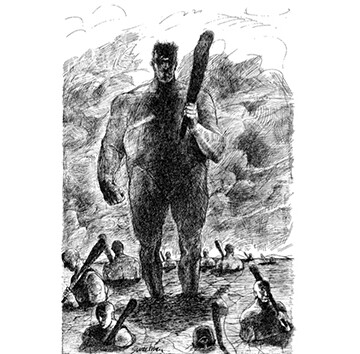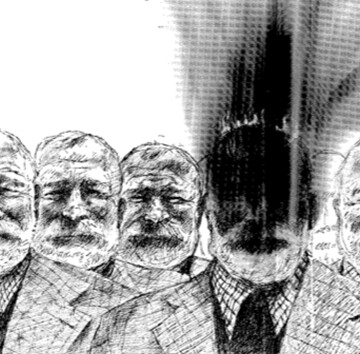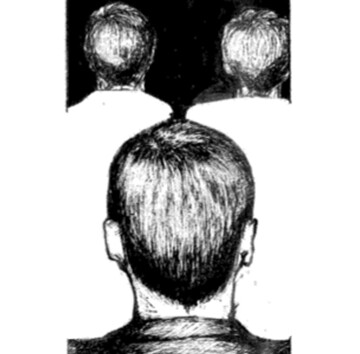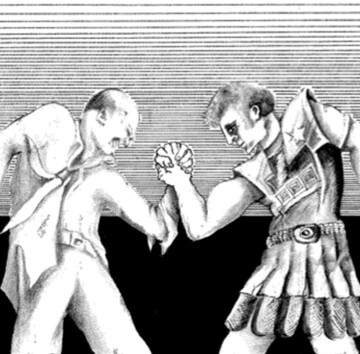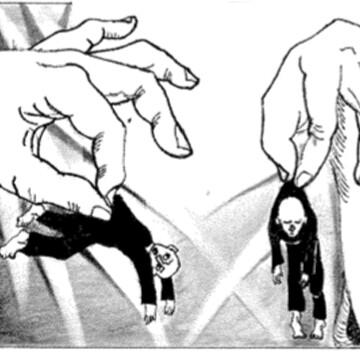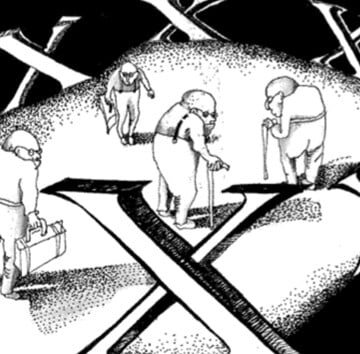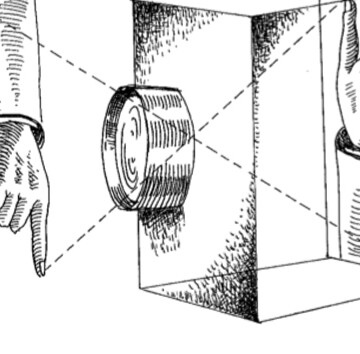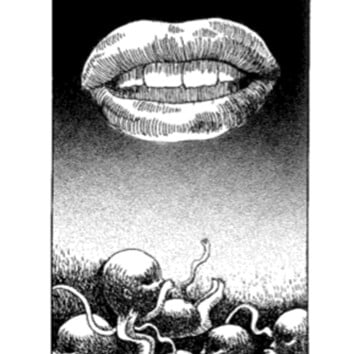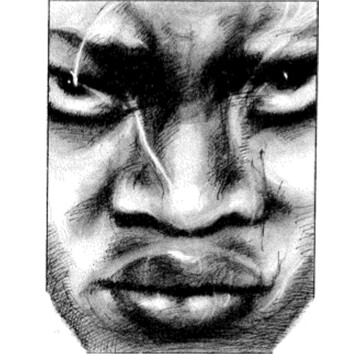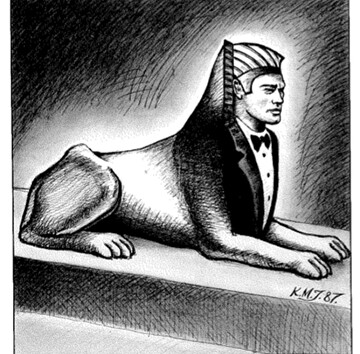Sprawled on the sands of the New Mexico desert, Isador Isaac Rabi was witness on July 16, 1945, to a demonstration of scientific power so spectacular that neither his welder’s glasses nor his analytical training could fully shield him from its awe-inspiring effects: Suddenly, there was an enormous flash of light, the brightest light I...
Category: Reviews
Myths of Imperialism
“The day of small nations has long passed away. The day of Empires has come.” —Joseph Chamberlain In a rational world, the term “imperialism” might have been a carefully defined and useful tool of political and social analysis, part of the study of how empires come into being. But the story of “imperialism” is typical...
Hemingway and the Biographical Heresy
“Vilify! Vilify! Some of it will always stick.” —Beaumarchais When I learned some time ago that the critic Kenneth S. Lynn was bringing out a book on the late Ernest Hemingway, hard on the heels of the large biographical study by Jeffrey Myers, I anticipated a reasonably cogent analysis of the stories, the several novels,...
Selling Out
“Sed quis custodiet ipsos Custodes?” —Juvenal On November 29, 1984, an FBI agent in Massachusetts took extensive notes from a long conversation with an alcoholic woman about the alleged Soviet spy activities of her former husband, John Walker. Barbara Walker initiated the meeting with a phone call on November 17. Her story was filed and...
States of Nature
A renaissance of American interest in contemporary Africa has been stimulated by media blitzes on famine-ridden Ethiopia and politically volatile South Africa, and by an award- winning film about a Norwegian adulteress’s African farm. Among the current crop of books is David Lamb’s The Africans, an update of a 1983 book. Lamb, who spent four...
West Beats East
Along with Xenophon and Plutarch, Herodotus may be the most underappreciated writer of antiquity. His Histories (by which he meant something like “investigations”) of the relations between Greeks and barbarians has more narrative power than most novels, more colorful incidents than any travel book, and more insight into human nature than any 1,000 works of...
The Treason System
The Germans have a word for it: Schadenfreude. It means, literally, harm-joy, and refers to the nasty but common human tendency to rejoice when harm comes to someone else. In English, we don’t have the word, but we certainly have the phenomenon. Think of the nationwide jubilation over what happened to Richard Nixon (and, incidentally,...
Gemeinschaft Without Mussolini
“Modern society acknowledges no neighbor.” —Disraeli Separate thinkers have often thought the same thoughts when the time was ripe. The same needs will be felt, or the same things will be perceived wrong by sociologists in California and philosophers in the Midwest. Perhaps this means our minds are so social that a sense of alienation,...
Greek Jive
“He fell with a thud to the ground and his armor clattered around him.” —Homer War Music, called by its author, Christopher Logue, an “account” of four books of the Iliad of Homer, is not a minor event. Its reception both in its native England, and now here, has been enthusiastic. For, English writing, especially...
Sums of Disenchantment
Zulfikar Chose was born in Pakistan, grew up in British India, emigrated to England in 1952, and since 1969 has taught in the English department of the University of Texas. He is married to a Brazilian and has enough knowledge of South America to write novels set there. This is his 10th novel. He has...
Some Place in Time
“Rural areas are shrinking, accents are becoming less distinct, and Southerners are being tamed,” writes Pete Daniels of the changes which have transformed the agrarian nation of Davis and Lee into the modern South. Daniels may have his feet planted firmly in earthy Southern history, but there has not been a concerted demand by creationists...
Gimme That Ol’Time Education
” . . . Form and Limit belong to the Good.” —C.S. Lewis Liberals in the United States have lately gathered around the standard of pluralism in the hope of stalling the movement toward private Christian education. Yet Americans, historically indifferent to such objections, have been the last to censure a church—especially a reformed or...
Postmortem
“We would rather run ourselves down than not speak of ourselves at all.” —La Rochefoucauld When the reputable and talented die, it is often their fate to have their privacy examined in detail. This is a mixed blessing at best. How chilling it is to remember that Nijinski’s feet were cut open to see if...
The Revenge of History
History has a way of taking its revenge on those who would violate it. It does not forget. Mikhail Heller and Aleksandr Nekrich are some of the few Soviet-born intellectuals who have studied how much current Soviet policies and propaganda abuse Russian history. Their book is an eloquent effort to set straight the historical record...
National Liberation Literature
“The Devil understands Welsh.” —Shakespeare Years ago, in the North Welsh town of Llanrwst, I bought a copy of Dylan Thomas’ Collected Poems, and a 50-year-old Welshman present, a Baptist, teetotalling, nonsmoking, nondancing insurance agent, said, “A wonderful boy and a great poet: a terrible loss to Wales.” It was the first time I had...
Now That the Dust Has Settled
American poetry has for the past few decades been going through what can only be called an adolescence, discarding rules and conventions simply because they existed. Poetry and all the arts go through a healthy siege of anarchy every so often, but this was more like terrorism than a revolution; these revolutionaries, unlike the Romantics,...
A Half-Open Mind
“The discussion is concerned with no commonplace subject but with how one ought to live.” —Plato During the month of June, Allan Bloom’s observations on the state of American education climbed their way dramatically toward the peak of the New York Times nonfiction bestseller list. Why would such a book engage a mass readership? Bloom’s...
Protestant Polities, Religion, and American Public Life
“Every sect is a moral check on its neighbor. Competition is as wholesome in religion as in commerce.” —Walter Savage Landor When English Protestants fled their native land during Mary’s reign, many of them ended up in John Calvin’s Geneva. Additional refugees found a home in other Reformed cities in southwestern Germany. Lutheran lands, by...
Resisting in Berlin
“The (anti-Hitler) conspiracy failed,” wrote the late Willi Schlamm, himself a refugee from Nazism, nearly 30 years ago. “But the list of names of those whom a maddened Hitler hanged after the failure reads like a Gotha of Germany’s famous military families. . . . They are names which, if the truth indeed prevails, will...
Mother’s Darling
Hannah Lehmann is one of six children in a wealthy. New York, Orthodox Jewish family headed by a somewhat caustic, undemonstrative mother and a father whose concern is business. Hannah is obsessed with her mother, who never loved her enough, but whom Hannah cannot leave, forgive, or stop thinking about. Years, lovers, and psychiatrists do...
Lillian Hellman, True and False
“Female murderers get sheaves of offers of marriage.” —Shaw In a recent issue of The Nation, John L. Hess complains about the current flow of books demythologizing the venerated martyrs of the American left. So what if new historical research suggests that the Rosenbergs (or at least one of them) were actually guilty? So what...
Marilyn and Gloria
“Love-making is radical, while marriage is conservative.” —Eric Hoffer One day in the early 70’s, I read a magazine article in which Gloria Steinem was reported to have said that she would have no problem continuing her work as a writer should she ever have a baby—she’d do her writing when the baby napped. I...
The Hammer of Hunger
“Every scarecrow secretly desires to terrorize.” —Stanislaw Lee When, from time to time, a responsible official in the United States suggests we employ our abundance of food as a “weapon” in our struggle with Communist totalitarianism, a clamor of protest arises from one end of the country to the other. But when the Communists wield...
Sense and Sensibility
It is a rare American poem, this late in the 20th century, that dares to be understood. Jane Greer’s slim volume, Bathsheba on the Third Day, is full of such poems, which give this first book a mature heft and solidity. The maturity should not be surprising. Jane Greer is the founding editor of Plains...
The World According to St. Mugg
If we are to believe today’s pundits—an awfully big “if”—there are many global crises threatening the 20th century. Nuclear weapons and overpopulation currently top the list. Unfortunately, it sometimes seems that there are only two available responses. The first is the “liberal” response, which assumes that mankind already possesses the tools and skills to repair...
Boomtown Philosophers
Why is it that America has noticed the “Boom” in Latin American fiction but has ignored Latin American philosophy? One obvious reason lies in the unavailability of translated texts. While novelists have energetically and strategically combined efforts to publish translations of their works in the United States, nothing of the sort has happened in Latin...
Government Of, By, and Against the Public
Although it is widely believed that persons who oppose big government are sympathetic to large businesses and have no compassion for the little guy, no such logical connection exists. Democratic governments, as the author points out, respond to the interests of large, well-organized, and well-financed groups. Big business learned to induce governments “to further their...
The Third World Revisited
“Sixty thousand blacks are annually embarked from the coast of Guinea, never to return to their native country; but they are embarked in chains; and this constant emigration which in the space of two centuries might have furnished armies to overrun the globe, accuses the guilt of Europe and the weakness of Africa.” —Edward Gibbon...
Stargazers
The political left’s deconstruction of “Twinkle, Twinkle, Little Star” into an ICBM closing on a child’s bedroom window is only the most memorable of the assaults on the Strategic Defense Initiative since it was announced by President Ronald Reagan on March 23, 1983. But the ever-shifting tactics also point up the failure of an anti-SDI...
An Invisible Man
“I never desire to converse with a man who has written more than he has read.” —Samuel Johnson The late Louis Lomax, columnist and television personality, had delivered a lecture at Ferris State College, Michigan, when there arose in the audience a large, militant, black activist. “Lomax,” said this challenger, grimly, “do you call yourself...
Invasion of the Child-Snatchers
Who has more rights in the American judicial system—a man accused of murder or one accused of child abuse? The accused murderer is guaranteed the good old English right of trial by jury; he’s presumed innocent until proved guilty. He may even demand a court-appointed lawyer (if he can’t afford his own). The accused child...
Institutionalized Music
Samuel Lipman’s pieces on music came out originally in magazines, chiefly in Commentary and The New Criterion. The obvious question arises. Are enough of these essays of sufficient interest and importance to justify republication? The answer is happily yes. Lipman’s candor, taste, and intelligence as well as the wide range of his musical interests make...
Old Babbitts Die Hard
“Believe me, it’s the fellow with four to ten thousand a year, say, and an automobile and a nice little family in a bungalow on the edge of town, that makes the wheels of progress go round.” —George F. Babbitt The most prominent buildings of a civilization speak eloquently of what it esteems. The great...
Fine China
“In this age of decadence people love antiques and willingly submit to deception.” —Cheng Hsieh, 18th-century Chinese poet and painter Anyone who fondly supposes that the Chinese Communists are the “good” Communists should read this exciting, powerful book by the Belgian sinologist Pierre Ryekmans, writing under his nom de plume, Simon Leys. As far back...
Unraveling the Remnant
“Whatever the road to power, that is the road which will be trod.” —Edmund Burke For years, or at least for that stretch of time between the heady days of Theodore Roosevelt and the hapless days of Jimmy Carter, something called the Eastern establishment benevolently ruled over America. For years, or at least between the...
Past and Present
“The handwriting on the wall may be a forgery.” —Ralph Hodgson A steady flow of scholarly works on the intellectual roots of modern conservatism has appeared since the 1950’s. Russell Kirk’s The Conservative Mind was and remains the best and the best-known of such books, but similar studies by Peter Viereck, Clinton Rossiter, and others...
Love and Death
Perhaps it is inevitable that Life and Fate by Vasily Grossman has been compared to Leo Tolstoy’s War and Peace. There are obvious parallels. Tolstoy wrote a lengthy book on the unsuccessful Napoleonic invasion of Russia, while Grossman wrote a lengthy book on the unsuccessful Nazi invasion of the Soviet Union. Both works also deal...
The Triumph of Time
The second law of thermodynamics poses a problem for evolutionary biologists. While it seems to predict increasing disorder over time, the record of evolution suggests ever-increasing order and higher levels of organization. The common solution to the paradox was to look for a balance between organic systems and their environment. Perhaps there was, as Schrodinger...
A Second Opinion
This profoundly conservative book forms a powerful personal argument against the liberal dogma that “modernity” destroys religion. Much of the left, militantly secular as it is, has attempted to make it “self-evident” that no reasonable person can believe in God, let alone in a particular religious tradition and its revelation. “We all know” that religion...
Prairie Dog
Fairbanks has an interesting hypothesis: that early prairie women loved the plains and their adventurous lives here as much as pioneer men did. I have never believed in the myth that every pioneer woman was long-suffering, silently hating the prairie and the man who brought her here. I was pleased to think that I’d found...
Security Safari
“Be sober, be vigilant; because your adversary, the Devil, as a roaring lion, walketh about, seeking whom he may devour.” —1 Peter, V, 8 The scene is so identifiable that any American—in fact, almost anyone anywhere in the world—immediately recognizes it: a dun-baked, dusty street between rows of ramshackle, weather-beaten, false-fronted buildings. To the pounding...
Players of the Game
” . . . to chase the rolling circle’s speed Or urge the Hying ball . . . “ —Thomas Gray The Puritans, who once condemned stool ball, quoits, and bowls, would stand in stern judgment of the millions of Americans who every Sunday choose a ball game over church attendance. Yet game-playing did begin...
Prurient Puritans
These apparently very different books—a cultural history and research on American sexual mores—actually address the same issue: the attempt to reconcile morality and the sexual impulse. A typically puritanical endeavor, because the puritan, with his eternal bad conscience about things that may not please God, that is sin, goes through mental, moral, and behavioral contortion...
Babbitt in the Eighties
Six of this book’s 10 essays were presented at a conference commemorating the 50th anniversary of Irving Babbitt’s death. Held in Washington, DC, at The Catholic University of America in November 1983, the conference brought together scholars of various disciplines to address the general subject of “Irving Babbitt: Fifty Years Later.” Although some people might...
Catholic Church USA
Three histories of the Catholic Church in the United States have become available within a two-year period—books by James Hennesey, S.J., Martin Marty, and now Jay P. Dolan, the bitterest of the three. More remarkable than the mere number are the significant likenesses. Are they the result of the zeitgeist or an attempt to shape...
Character in Acting
To 18th-century Britons and Americans who devoted any serious thought to the subject of human nature—and a great many did—the conventional starting point was the theory of the passions, or drives for self-gratification. Rousseau to the contrary, man was not naturally good but was ruled by his passions, both primary (fear, hunger, lust) and secondary...
Empire Strikes Back
” . . . To sit in darkness here hatching vain empires.” —Milton During his discussion of the overthrow of feudalism by the bourgeoisie in his classic Capitalism, Socialism and Democracy, Joseph Schumpeter asked whether “in the end such complete emancipation was good for the bourgeois and his world.” He concluded that it had not...
Out of the Closet, Into the Morgue
Homosexual activists will not like this book. For if ever there were an empirical refutation to the “gay rights” agenda. Gene Antonio has written it. In convincing (sometimes nauseating) detail, Antonio explains why the homosexual movement has provided the ideal conduit for one of the most lethal diseases ever to affect mankind. Yet homosexuals and...
Talk to Me
The last 20 years have seen the proliferation of a machine that stores, organizes, and retrieves information: the computer. It can perform repetitive tasks without error or fatigue, analyze problems too complex for the human brain, and collate great quantities of information. The power of the computer, however, has its drawbacks—among other things, it allows...
A Strange Career
C. Vann Woodward, Sterling Professor of History Emeritus at Yale University and a contributing editor to The New Republic, is the leading liberal historian of the South. For three decades his encyclopedic knowledge and detailed historical investigations have produced works that have set the pattern for subsequent historians. Woodward accepts the title “liberal,” if somewhat...


